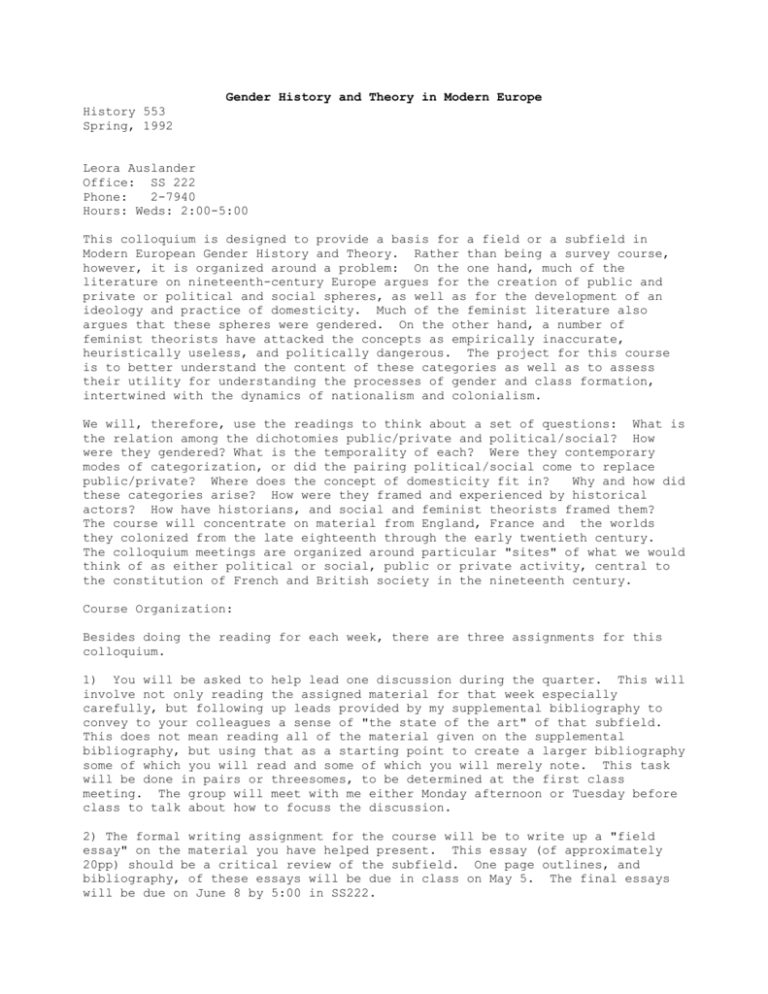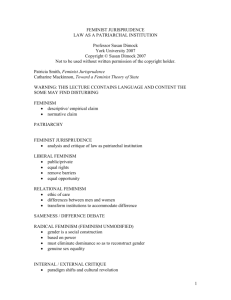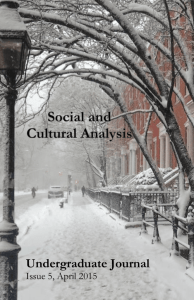European Gender Theory and History
advertisement

Gender History and Theory in Modern Europe History 553 Spring, 1992 Leora Auslander Office: SS 222 Phone: 2-7940 Hours: Weds: 2:00-5:00 This colloquium is designed to provide a basis for a field or a subfield in Modern European Gender History and Theory. Rather than being a survey course, however, it is organized around a problem: On the one hand, much of the literature on nineteenth-century Europe argues for the creation of public and private or political and social spheres, as well as for the development of an ideology and practice of domesticity. Much of the feminist literature also argues that these spheres were gendered. On the other hand, a number of feminist theorists have attacked the concepts as empirically inaccurate, heuristically useless, and politically dangerous. The project for this course is to better understand the content of these categories as well as to assess their utility for understanding the processes of gender and class formation, intertwined with the dynamics of nationalism and colonialism. We will, therefore, use the readings to think about a set of questions: What is the relation among the dichotomies public/private and political/social? How were they gendered? What is the temporality of each? Were they contemporary modes of categorization, or did the pairing political/social come to replace public/private? Where does the concept of domesticity fit in? Why and how did these categories arise? How were they framed and experienced by historical actors? How have historians, and social and feminist theorists framed them? The course will concentrate on material from England, France and the worlds they colonized from the late eighteenth through the early twentieth century. The colloquium meetings are organized around particular "sites" of what we would think of as either political or social, public or private activity, central to the constitution of French and British society in the nineteenth century. Course Organization: Besides doing the reading for each week, there are three assignments for this colloquium. 1) You will be asked to help lead one discussion during the quarter. This will involve not only reading the assigned material for that week especially carefully, but following up leads provided by my supplemental bibliography to convey to your colleagues a sense of "the state of the art" of that subfield. This does not mean reading all of the material given on the supplemental bibliography, but using that as a starting point to create a larger bibliography some of which you will read and some of which you will merely note. This task will be done in pairs or threesomes, to be determined at the first class meeting. The group will meet with me either Monday afternoon or Tuesday before class to talk about how to focuss the discussion. 2) The formal writing assignment for the course will be to write up a "field essay" on the material you have helped present. This essay (of approximately 20pp) should be a critical review of the subfield. One page outlines, and bibliography, of these essays will be due in class on May 5. The final essays will be due on June 8 by 5:00 in SS222. 3) A further goal of this course is to create an ongoing file of reading notes on books in order to enable the greatest number of students possible to be familiar with the greatest amount of material possible. You will each be asked twice during the term to prepare careful notes on either a book (or set of articles) on the supplemental bibliography, or on one of the required readings during a week in which the reading is being split. Please feel free to choose your own readings. I would like to have a commitment to two texts from everyone by second (or at latest, third) week. Enough copies of your notes for everyone in the class will be due by the Monday before the appropriate class at 3:00 in SS 222. The material covered by the notes will also be discussed. By the end of the quarter you should have notes on all of the books on the syllabus, plus an additional forty or so (depending how many people there are in the class.) Week 1. Week 2. March 31. Introductory: Public/Private and the Political/Social April 7. Conceptualizing the Making and Gendering of the "Social" and the "Political" Denise Riley, Am I that Name? Carole Pateman, The Sexual Contract. Week 3. April 14. Revolution The Public/Private -- Political/Social in the French Dorinda Outram, The Body and the French Revolution: Sex, Class and Political Culture Joan Landes, Women and the Public Sphere in the Age of the French Revolution Week 4. April 21. The Gender Logic of "Political" Economy and the Gendered Division of Labor Maxine Berg, The Machinery Question and the Making of Political Economy, 1815-1848. Mary Freifeld, "Technological Change and the 'Self-acting' Mule: a Study of Skill and the Sexual Division of Labour," Social History, vol 11 (1986), pp. 319-343. Joan Scott, "'L'ouvriŠre! Mot impie, sordide...' Women Workers in the Discourse of French Political Economy, 1840-1860." in her Gender and the Politics of History (New York: Columbia U Press, 1988) 139-166. Section on "Rethinking Political Economy" in Elizabeth Weed, ed. Coming to Terms (London: Routledge, 1989) Please read the Berg and one of the three other offerings. Week 5. April 28. The Gendering of "Political" Militancy: and Socialism Trade Unionism Leora Auslander, Perceptions of Beauty and the Problem of Consciousness: Parisian Furniture Makers", forthcoming in The New French Labor History, Lenard Berlanstein, ed. Keith McClelland, "Masculinity and the 'Representative Artisan' in Britain, 1850-1880." in Manful Assertions Sonya O. Rose, "Gender Antagonism and Class Conflict: Exclusionary strategies of Male Trade Unionists in Nineteenth-Century Britain," Social History, vol. 13 (1988), pp. 191-208. Joan Scott, "Work Identities for Men and Women: The Politics of Work and Family in the Parisian Garment Trades in 1848." in Gender and the Politics of History Barbara Taylor, "'The Men are as Bad as their Masters...' Socialism, Feminism, and Sexual Antagonism in the London Tailoring Trade." Feminist Studies 5/1 (1979). Week 6. May 5. "Social" Economy in France Katherine Lynch, Family, Class, and Ideology in Early Industrial France: Social Policy and the Working-Class Family, 1825-1848 Paul Rabinow, French Modern: Norms and Forms of the Social Environment Please choose one of these two. Week 7. May 12. Constituting the "Social" through practice Leonore Davidoff and Catherine Hall, Family Fortunes: Men and Women of the English Middle Class, 1780-1850 Bonnie Smith, Ladies of the Leisure Class John Tosh, "Domesticity and Manliness in the Victorian Middle Class," Manful Assertions Norma Clarke, "Strenuous Idleness," in Manful Assertions Michael Wilson, "'Sans les femmes, qu'est-ce qui nous resterait?: Gender and Transgression in Bohemian Montmartre," in Body Guards Julia Epstein and Kristina Straub, eds. (London: Routledge, 1991) Please choose one book and one article. Week 8. May 19. "Social" Feminism Naomi Black, Social Feminism -- only sections on Britain and France. Margaret Llewllyn Davies, ed. Life as We Have Known It. Week 9. May 26. Imperialist (Social) Feminism and Gendered Colonialism Margaret Strobel, European Women and the Second British Empire Malek Alloula, The Colonial Harem Graham Dawson, "The Blond Bedouin" in Manful Assertions Marjorie Garber, "The Chic of Araby: Transvestism and the Erotics of Cultural Appropriation" in her Vested Interests: Crossdressing and Cultural Anxiety (also in Body Guards) Please read one book and one article Week 10. June 2. Theory and History in Feminist Research Kate Soper, "Constructa ergo sum?" ch. 6 in her Troubled Pleasures (London: Verso, 1990) Joan Cocks, The Oppositional Imagination: Feminism, Critique, and Political Theory (London: Routledge, 1989), 82-118. Liz Stanley, Feminist Praxis (London: Routledge, 1990) Jennifer Terry, "Theorizing Deviant Historiography." Differences 5 (Summer 1991)









